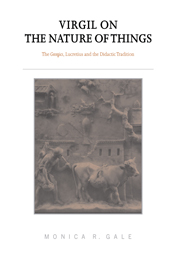Book contents
- Frontmatter
- Contents
- Preface
- List of abbreviations
- 1 Introduction: influence, allusion, intertextuality
- 2 Beginnings and endings
- 3 The gods, the farmer and the natural world
- 4 Virgil's metamorphoses: mythological allusions
- 5 Labor improbus
- 6 The wonders of the natural world
- 7 The cosmic battlefield: warfare and military imagery
- 8 Epilogue: the philosopher and the farmer
- Bibliography
- Index of passages cited
- General index
2 - Beginnings and endings
Published online by Cambridge University Press: 15 October 2009
- Frontmatter
- Contents
- Preface
- List of abbreviations
- 1 Introduction: influence, allusion, intertextuality
- 2 Beginnings and endings
- 3 The gods, the farmer and the natural world
- 4 Virgil's metamorphoses: mythological allusions
- 5 Labor improbus
- 6 The wonders of the natural world
- 7 The cosmic battlefield: warfare and military imagery
- 8 Epilogue: the philosopher and the farmer
- Bibliography
- Index of passages cited
- General index
Summary
We saw in chapter 1 that the very centre of the Georgics – the finale to book 2 and the proem to book 3 – is occupied by a pair of programmatic statements, which indicate the complex intertextual make-up of the poem. Lucretius is given a prominent part in both passages; and in this sense, too, the central block is emblematic of the poem as a whole. In this chapter, I will suggest that the second finale and the third proem are typical of the poem as a whole, in their close engagement with Lucretius: each of the eight beginnings and endings can be read as a response to central themes of the DRN. But we can also see the elaborate patterning of the poem as a Lucretian element in itself.
One of the most strikingly ‘classical’ features of the Georgics is the elegant balance of its structure. It has often been observed that ‘dark’ books (1 and 3) alternate with books which are generally lighter in mood (2 and 4). On a smaller scale, there are a number of instances of responsion between passages which occupy parallel positions in different books, or within the same book. For example, the digression on the end of the Golden Age begins at line 125 of the first book, while the description of the old Corycian's garden is located in a corresponding position in 4.125ff.; similarly, the digression on amor at the end of the first half of book 3 has clear parallels with the account of the Noric plague at the end of the second half. But the clearest example of this kind of patterning – and the one which will principally concern us in this chapter – is to be found in the proems and conclusions of the four books.
- Type
- Chapter
- Information
- Virgil on the Nature of ThingsThe Georgics, Lucretius and the Didactic Tradition, pp. 18 - 57Publisher: Cambridge University PressPrint publication year: 2000



